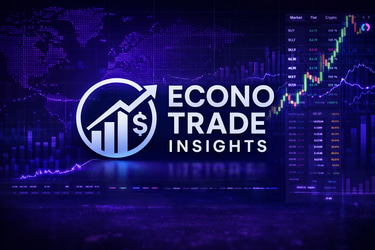Understanding the Impact of the China-US Trade War on Financial Markets
11/7/20254 min read


The Origins of the China-US Trade War
The origins of the China-US trade war can be traced back to a complex interplay of economic and political factors that have evolved over several decades. A significant point of contention has been the trade deficit that the United States experiences with China. In recent years, this deficit has grown substantially, leading to concerns among American policymakers regarding the sustainability of this economic imbalance. The U.S. has consistently criticized China for engaging in practices viewed as unfair, including currency manipulation, which is perceived to give Chinese exports an unjust advantage in the global market.
Another critical element that has fueled tensions is the issue of intellectual property rights. The United States has accused China of engaging in systematic theft of intellectual property, including the forced transfer of technology from American businesses to Chinese companies. This has raised alarms among U.S. businesses and has led to growing calls for protection and reform of intellectual property laws. The perception that the Chinese government supports these practices has only intensified the existing animosity.
As frustrations mounted, both nations began imposing tariffs on each other's goods. The initial imposition of tariffs by the U.S. in 2018 marked a significant turning point, escalating a series of trade disputes into what is now recognized as a trade war. China retaliated with its own tariffs, creating a cycle of tit-for-tat measures that affected various industries in both nations. These tariffs not only increased the cost of imported goods but also disrupted supply chains, thereby impacting global trade patterns significantly. As a result, the trade war became emblematic of larger strategic competition between the two powers, illustrating a shift away from decades of cooperative economic policies towards a more confrontational approach in international relations.
Key Developments and Current Status
The China-US trade war, which began in earnest in 2018, has seen significant developments that continue to shape the global financial landscape. Initially marked by the imposition of tariffs by both nations, the conflict has evolved into a complex interplay of economic policies, negotiations, and strategic positioning. Recent dialogues have shown a willingness on both sides to find common ground, yet substantial hurdles remain. The relationship between China and the United States is pivotal, impacting not only bilateral trade but also global market dynamics.
In the past year, key negotiations have taken place, focusing on topics such as technology transfer, intellectual property rights, and trade imbalances. Both countries have sought to solidify their positions while navigating a challenging economic environment exacerbated by the COVID-19 pandemic. The pandemic underscored vulnerabilities within supply chains and prompted reevaluations of dependency on foreign goods, particularly in critical sectors like pharmaceuticals and technology. This shift altered trade dynamics and led to discussions about “decoupling” certain industries from China.
Tariffs remain a significant aspect of the trade war, influencing prices and availability of goods in both markets. The US has maintained various tariffs on Chinese imports, while China has responded with its own duties and retaliatory measures. These trade policies have created a ripple effect, prompting shifts in trade flows between the two countries. Current statistics indicate that while trade volumes have seen fluctuations, resilience exists as both nations adapt to the new normal. Additionally, the geopolitical implications of the trade war continue to unfold, prompting other nations to reevaluate their alliances and trade agreements.
As developments progress, it becomes increasingly critical for stakeholders to stay informed about ongoing negotiations, policy changes, and the broader impact of the trade war on international finance.
Impact on Global Financial Markets
The China-US trade war has significantly influenced global financial markets, creating ripples felt across stock markets, currencies, and commodities worldwide. As trade tensions escalated, market volatility surged, driven by uncertainty regarding tariffs, trade agreements, and the overall economic outlook. Investors reacted swiftly to news and announcements, often leading to dramatic fluctuations in asset prices.
Stock markets, in particular, have experienced periods of instability. The technology sector, which is heavily reliant on international supply chains and cross-border sales, has faced notable challenges. Companies in this sector are sensitive to trade policies, as tariffs can increase costs and pressure profit margins. Furthermore, fluctuations in trade relations can also lead to decreased consumer spending and dampened business investment, adversely affecting tech stock valuations.
The agriculture sector has similarly felt the impact of the trade conflict. Farmers relying on exports to China, one of the largest importers of agricultural products, have faced uncertainty due to retaliatory tariffs. This situation has led to decreased prices for certain crops and a reassessment of long-term trading strategies. Additionally, commodities such as soybeans and pork have experienced fluctuations in prices, directly linked to the presence or absence of trade agreements.
Currencies have not been immune to the turmoil instigated by the trade war. The US dollar, often considered a safe haven during times of instability, has appreciated against several currencies as investors seek refuge. However, the resultant appreciation can complicate trade for American exporters, as their products become more expensive for foreign buyers. Conversely, the Chinese yuan has faced depreciation pressures, reflecting concerns about the potential slowdown in the Chinese economy due to tariff impacts.
In light of these factors, governments have employed various fiscal measures to stabilize their markets. Strategic interventions, including monetary policy adjustments and stimulus packages, have been critical in providing temporary relief to affected industries and maintaining investor confidence amidst the enduring uncertainty of the trade war.
Conclusion and Future Outlook
The China-US trade war has fundamentally altered the dynamics of financial markets, and its impact is expected to reverberate for years to come. As both nations navigate the complexities of tariffs, regulations, and bilateral relations, various potential scenarios could unfold. One possibility is a gradual resolution of trade tensions, which may foster an environment for enhanced economic collaboration and stability. Conversely, if the conflict persists, increased market volatility may become the norm, as investors react to shifting policies and economic indicators.
Long-term economic implications of the trade war may include disruptions in global supply chains, which could lead to changes in sourcing strategies among multinational corporations. Consequently, companies may seek diversification beyond China and the U.S., impacting industries and markets worldwide. In this context, investors need to remain vigilant and flexible, as shifts in economic landscapes can present both risks and opportunities. Moreover, understanding geopolitical developments will be essential for developing effective investing strategies and being responsive to market trends.
As the situation progresses, active participation in financial markets becomes increasingly paramount. Investors are encouraged to stay informed about ongoing developments and to reassess their portfolios in light of the evolving economic scenario. Utilizing reputable trading platforms can significantly enhance one’s ability to navigate the complexities associated with the current market environment. For those interested in crypto trading, https://www.okx.com/ offers a user-friendly interface and a wide range of resources. Additionally, GO AI-ACADEMY provides educational content to empower traders with the knowledge needed to make informed decisions.
EconoTrade Insights
Learn. Trade. Grow.
Empowering financial freedom through smart education and trusted tools.
© 2025 ECONO TRADE INSIGHTS. All rights reserved.
About - https://econotradeinsights.com/about-us-financial-blogging
Contact - econotradeinsights@gmail.com
Disclaimer - https://econotradeinsights.com/disclaimer
Terms & Conditions - https://econotradeinsights.com/terms-and-conditions
